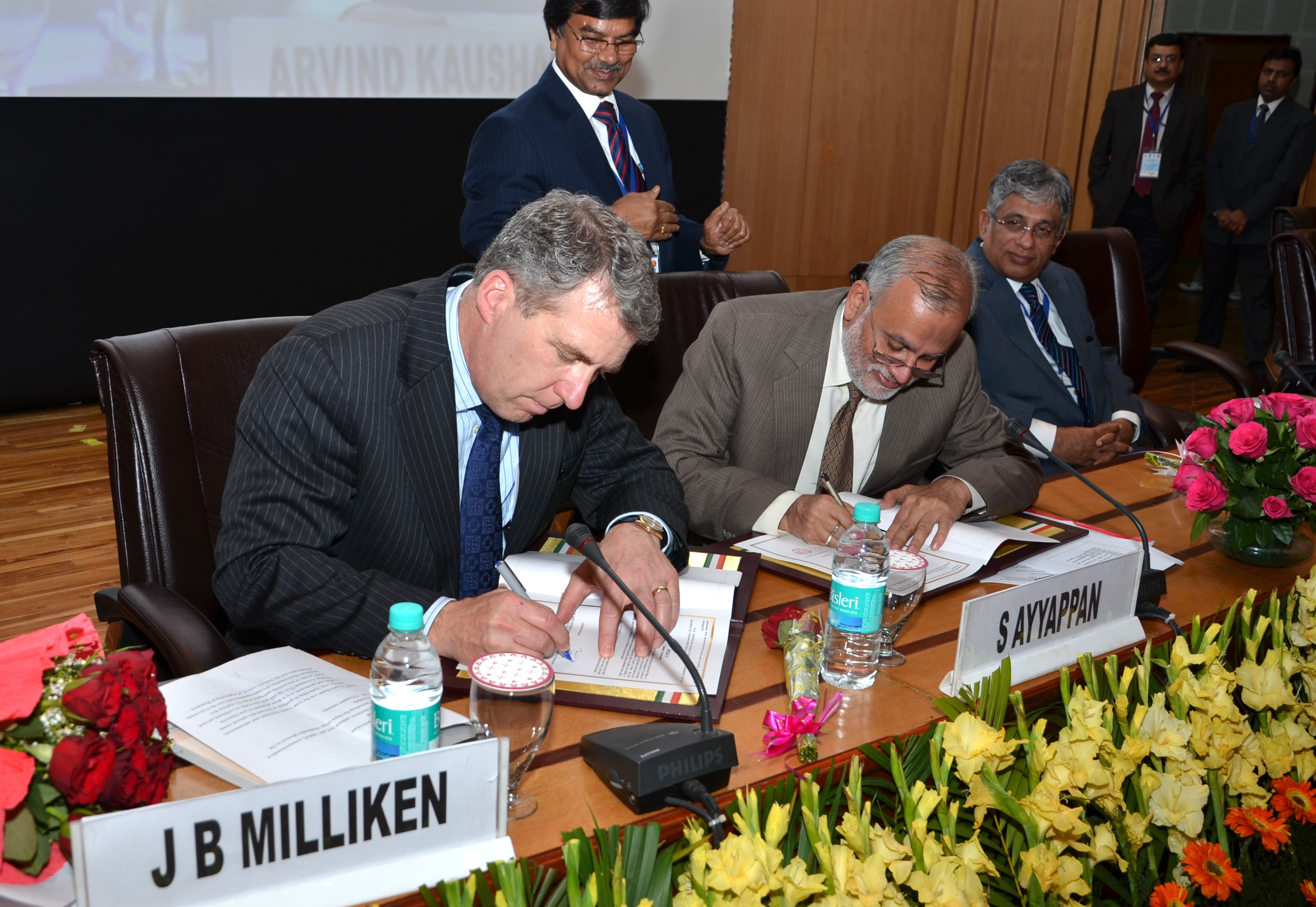
The University of Nebraska and the Indian Council of Agricultural Research, one of the largest and most influential agricultural organizations in the world, have finalized an agreement to collaborate on research and education efforts in the critical areas of water and food security.
University of Nebraska President James B. Milliken and Dr. S. Ayyappan, Director General of the Indian Council of Agricultural Research, signed the Memorandum of Understanding between the two institutions last week in New Delhi. They signed on behalf of NU’s Robert B. Daugherty Water for Food Institute and the Indian Agricultural Research Institute, respectively. The signing ceremony took place during a large meeting hosted by the Indian Council of Agricultural Research for senior Indian agricultural university leaders as well as agricultural university leaders from the Association of South East Asian Nations.
The agreement is the result of more than two years of careful planning between NU and the Council that included meetings and visits in both countries, jointly arranged workshops and symposia, and high-level engagement focused on developing the most important priorities and strategies for collaboration. Faculty and administrators at both institutions were actively involved in the planning.
The initial workplan focuses on drought monitoring and mitigation, development of heat- and drought-resistant wheat, corn and soybean varieties, and development of more productive, sustainable irrigation systems.
“The agreement ... provides for cooperative development in water and food security -- critical areas in Nebraska, India and around the world,” Milliken said. "I’m confident that our efforts will result in tremendous global benefits and I look forward to a long, productive and mutually beneficial partnership.”
Ronnie Green, NU vice president for agriculture and natural resources and vice chancellor of the Institute of Agriculture and Natural Resources at the University of Nebraska-Lincoln, said the collaboration brings together the expertise of UNL scientists from the university's world-class programs in drought monitoring and mitigation, plant genetics and biotechnology, irrigation engineering and precision agriculture to create new solutions for Indian agriculture and natural resources management.
"Development of a drought early warning system and more drought- and flood-resilient corn, soybeans and wheat anticipated from these efforts will be a major contribution to enhanced long-term food and water security in India and southeast Asia,” Green said.
Roberto Lenton, founding executive director of the Daugherty Institute, said: “I am delighted by the signature of the MOU, which will provide exciting opportunities for close collaboration with scientists at the Water Technology Center of the Indian Agricultural Research Institute to develop innovations in drought management, drought-tolerant crops, and high-efficiency irrigation that will ultimately result in ‘more crop per drop.’
"This collaboration addresses issues that lie at the heart of the mission of the Robert B. Daugherty Water for Food Institute to help ensure sustainable food security in the face of a changing climate and growing competition for water, and is an excellent example of how we can expand our reach through strategic partnerships.”
The Indian Council of Agricultural Research is the leading organization in India for coordinating, guiding and managing research and education in agriculture, including horticulture, fisheries and animal sciences. The Indian Agricultural Research Institutes is one of its four national institutes. The Council played a leading role in the Green Revolution and subsequent developments in agriculture in India that have allowed the country to significantly improve yields and feed many more people. The council also is a leading advocate for excellence in higher education in agriculture.
“This collaboration will strengthen our capacity to combat drought through development of an early warning system, abiotic stress-tolerant crop varieties and energy-efficient and water-conserving irrigation systems,” Ayyappan said.
The agreement between the two institutions calls for development of annual workplans that will specify research and education activities to be jointly carried out. Initial discussions have identified several potential focus areas:
-- Development of a drought monitoring system with tools to quantify the impact of drought on irrigation water availability and food security. The National Drought Mitigation Center, based at UNL, would provide key resources and expertise in this area.
-- Development of wheat, maize and soybean crops that could better withstand stresses such as drought, heat, flooding and salinity.
-- Development of energy-efficient, water-conserving irrigation systems that could maximize agricultural productivity and food security.
India is among the select countries the University of Nebraska has identified as key partners for its global engagement activities. India shares NU’s interests in critical areas such as agriculture, early childhood education, public health and others that offer opportunities for mutually beneficial collaboration.
-- Melissa Lee, University of Nebraska Central Administration